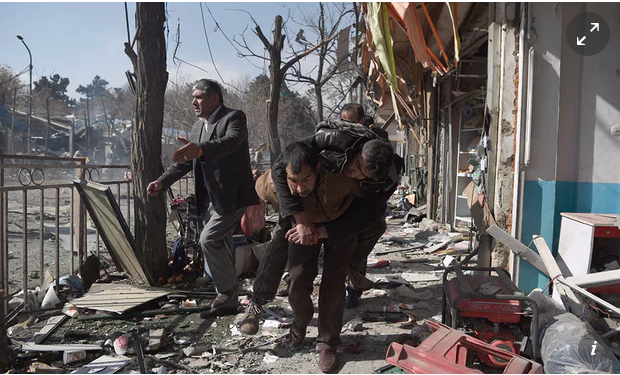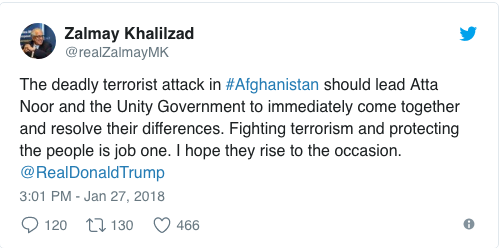The Guardian – Fear and despair in Afghan capital after more than 100 are killed in suicide attack
Kabul has reacted with despair and fear to one of the worst attacks for months in the Afghan capital, which killed more than 100 people and wounded at least 235.
There was helpless anger among residents on Sunday at the seemingly endless violence, after an ambulance packed with explosives blew up in a crowded city street the previous day, with security officials warning that more attacks are possible.
Mohammad Hanif, a shopkeeper, said: “How are we to live? Where should we go? We have no security. We don’t have a proper government. What should we do?”
Describing the attack, he said: “People were running everywhere to escape; there were wounded people lying on the ground, people with wounds to their arms, legs, heads.”
Wais Barmak, the interior minister, said the death toll had risen to at least 103. At least two vehicles painted as ambulances were involved in the attack, one of which blew up when it was stopped at a police checkpoint.
The blast was claimed by the Taliban, a week after its deadly attack on Kabul’s Intercontinental hotel, in a calculated answer to Donald Trump’s strategy in Afghanistan.
Zabihullah Mujahid, a Taliban spokesman, said: “The Islamic emirate has a clear message for Trump and his hand-kissers that if you go ahead with a policy of aggression and speak from the barrel of a gun, don’t expect Afghans to grow flowers in response.”
The US president, who last year sent more troops to Afghanistan and ordered an increase in airstrikes and other assistance to Afghan forces, said the attack “renews our resolve and that of our Afghan partners”.
The suicide bombing on Saturday was the worst in the Afghan capital since a truck bomb near the German embassy killed 150 people last May.
After a week in which the office of Save the Children in Jalalabad was also attacked, the western-backed government of Ashraf Ghani has faced growing pressure to improve security.
Despite a major tightening of checks following the embassy attack, the ambulance was able to get through the checkpoints, apparently without difficulty.
The bombing, in one of the most heavily protected parts of the city, close to foreign embassies and government buildings, showed that the ability of the Taliban to mount deadly, high-profile attacks that undermine confidence in the government is undiminished.
Pressure is likely to mount on Ghani to resolve political rows with his opponents, in particular with provincial power brokers defying central rule, and focus on security.
Najib Mahmood, a political science professor at Kabul University, said: “People think the government is working very badly and security is no good.
“The government can control the situation, but the president has to share power with others, he needs unity with other parties so they can fight the Taliban together.”
The former US ambassador to Afghanistan Zalmay Khalilzad called for Ghani’s government and its main political rival, Atta Mohammad Noor, to “come together and resolve their differences”.
The head of the UN mission in Afghanistan described the attack as an atrocity and it drew widespread condemnation from neighbouring countries and allies, who had expressed confidence that the US strategy was producing results.
The Afghan president’s office declared Sunday a day of mourning and said Monday would be a day off to allow for victims’ families to be cared for.
The UK foreign secretary, Boris Johnson, said he was “shocked and appalled” by the attack and condemned it in the strongest possible terms.
“The use of an ambulance as a weapon to target civilians is despicable. Once again, so many innocent Afghan lives lost and so many people’s lives affected. My heartfelt condolences go out to the victims and their families,” he said.
“The UK stands resolutely with Afghanistan against terrorism and calls for those responsible to be brought to justice.”



